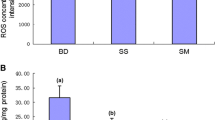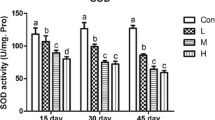Abstract
Selenium (Se) is an essential dietary trace element, which acts as an antioxidant. Heat shock proteins (HSPs) are a family of intracellular proteins whose synthesis is greatly increased upon exposure of cells to environmental stressors including oxidative metabolites, heavy metals, amino acid analogues and so on. However, little is known about the role of HSPs in oxidative stress damage induced by Se deficiency in the chicken liver. The aim of this study was to investigate the effects of Se deficiency on the expression levels of HSPs (Hsps27, 40, 60, 70, and 90) and oxidative indexes in the chicken liver. A total of 300 1-day-old sea blue white laying hens were divided into two groups (n = 150/group), and each of those groups was randomly divided into groups so that the trials were conducted in triplicate. The Se-deficient group (−Se) was fed a Se-deficient corn-soy basal diet (the Se content was 0.02 mg/kg); the Se-adequate group as control (+Se) was fed the same basal diet supplemented with Se at 0.2 mg/kg (sodium selenite). The liver tissue was collected and examined for pathological observations, oxidative indexes, mRNA and protein levels of HSPs genes at 15, 25, 35, 45, 55 and 65 days old. The histopathological analysis showed that liver tissues were injured seriously in the Se-deficient group. The oxidative indexes data showed that the malondialdehyde (MDA) level increased and the activity of L-glutathione (GSH) and glutathione peroxidase (GSH-Px) in the chicken liver decreased in Se-deficient group (p < 0.05). Additionally, the mRNA levels of HSPs (27, 40, 60, 70, and 90) increased significantly (p < 0.05) in the Se-deficient group compare to the corresponding control group. Meanwhile, the protein expression of HSPs (60, 70, and 90) also increased significantly (p < 0.05) in the Se-deficient group. These results suggested that oxidative stress and the levels of HSPs expression levels in chicken liver can be influenced by dietary Se deficiency. And HSPs played an important role in the protection of the liver after oxidative stress due to Se deficiency.





Similar content being viewed by others
References
Al-Aqil A, Zulkifli I (2009) Changes in heat shock protein 70 expression and blood characteristics in transported broiler chickens as affected by housing and early age feed restriction. Poult Sci 88:1358–1364. doi:10.3382/ps.2008-00554
Bernabo P, Rebecchi L, Jousson O, Martinez-Guitarte JL, Lencioni V (2011) Thermotolerance and hsp70 heat shock response in the cold-stenothermal chironomid Pseudodiamesa branickii (NE Italy). Cell Stress Chaperones 16:403–410. doi:10.1007/s12192-010-0251-5
Borek C, Ong A, Mason H, Donahue L, Biaglow JE (1986) Selenium and vitamin E inhibit radiogenic and chemically induced transformation in vitro via different mechanisms. Proc Natl Acad Sci USA 83:1490–1494
Burk RF, Hill KE (2005) Selenoprotein P: an extracellular protein with unique physical characteristics and a role in selenium homeostasis. Annu Rev Nutr 25:215–235. doi:10.1146/annurev.nutr.24.012003.132120
Burk RF et al (2008) Selenium deficiency activates mouse liver Nrf2-ARE but vitamin E deficiency does not. Free Radic Biol Med 44:1617–1623. doi:10.1016/j.freeradbiomed.2008.01.016
Carlson BA, Yoo MH, Shrimali RK, Irons R, Gladyshev VN, Hatfield DL, Park JM (2010) Role of selenium-containing proteins in T-cell and macrophage function. Proc Nutr Soc 69:300–310. doi:10.1017/S002966511000176X
Chen H, Xu XL, Li YP, Wu JX (2014) Characterization of heat shock protein 90, 70 and their transcriptional expression patterns on high temperature in adult of Grapholita molesta (Busck). Insect Sci 21:439–448. doi:10.1111/1744-7917.12057
Ellman GL (1959) Tissue sulfhydryl groups. Arch Biochem Biophys 82:70–77
Federico A et al (2005) Heat shock protein 27 expression in patients with chronic liver damage. Immunobiology 209:729–735. doi:10.1016/j.imbio.2004.12.006
Ferreccio C, Gonzalez Psych C, Milosavjlevic Stat V, Marshall Gredis G, Sancha AM (1998) Lung cancer and arsenic exposure in drinking water: a case-control study in northern Chile. Cadernos de Saude Publica 14(Suppl 3):193–198
Gabriel JE, da Mota AF, Boleli IC, Macari M, Coutinho LL (2002) Effect of moderate and severe heat stress on avian embryonic hsp70 gene expression. Growth Dev Aging 66:27–33
Guay J, Lambert H, Gingras-Breton G, Lavoie JN, Huot J, Landry J (1997) Regulation of actin filament dynamics by p38 map kinase-mediated phosphorylation of heat shock protein 27. J Cell Sci 110(Pt 3):357–368
Hall L, Martinus RD (2013) Hyperglycaemia and oxidative stress upregulate HSP60 & HSP70 expression in HeLa cells. SpringerPlus 2:431. doi:10.1186/2193-1801-2-431
Hino M, Kurogi K, Okubo MA, Murata-Hori M, Hosoya H (2000) Small heat shock protein 27 (HSP27) associates with tubulin/microtubules in HeLa cells. Biochem Biophys Res Commun 271:164–169. doi:10.1006/bbrc.2000.2553
Jun EJ, Ye JS, Hwang IS, Kim YK, Lee H (2011) Selenium deficiency contributes to the chronic myocarditis in coxsackievirus-infected mice. Acta Virol 55:23–29
Kaushal N, Bansal MP (2009) Diminished reproductive potential of male mice in response to selenium-induced oxidative stress: involvement of HSP70, HSP70-2, and MSJ-1. J Biochem Mol Toxicol 23:125–136. doi:10.1002/jbt.20276
Li J, Qian X, Sha B (2009) Heat shock protein 40: structural studies and their functional implications. Protein Pept Lett 16:606–612
Lindquist S, Craig EA (1988) The heat-shock proteins. Annu Rev Genetics 22:631–677. doi:10.1146/annurev.ge.22.120188.003215
Liu C, Li M, Cao Y, Qu JP, Zhang ZW, Xu SW, Li S (2014a) Effects of avermectin on immune function and oxidative stress in the pigeon spleen. Chem Biol Interact 210:43–50. doi:10.1016/j.cbi.2013.12.015
Liu CP, Fu J, Lin SL, Wang XS, Li S (2014b) Effects of dietary selenium deficiency on mRNA levels of twenty-one selenoprotein genes in the liver of layer chicken. Biol Trace Elem Res 159:192–198. doi:10.1007/s12011-014-0005-9
Martinus RD, Garth GP, Webster TL, Cartwright P, Naylor DJ, Hoj PB, Hoogenraad NJ (1996) Selective induction of mitochondrial chaperones in response to loss of the mitochondrial genome. Eur J Biochem/FEBS 240:98–103
Matsumoto K, Ui I, Satoh K, Tobe T, Ushio F, Endo K (2002) Evaluation of oxidative damage in the liver of selenium-deficient rats. Redox Rep 7:351–354. doi:10.1179/135100002125000974
Muller AS, Pallauf J, Most E (2002) Parameters of dietary selenium and vitamin E deficiency in growing rabbits. J Trace Elem Med Biol 16:47–55. doi:10.1016/S0946-672X(02)80008-6
Ogi S, Tanji N, Iseda T, Yokoyama M (1999) Expression of heat shock proteins in developing and degenerating rat testes. Arch Androl 43:163–171
Parsell DA, Lindquist S (1993) The function of heat-shock proteins in stress tolerance: degradation and reactivation of damaged proteins. Annu Rev Genetics 27:437–496. doi:10.1146/annurev.ge.27.120193.002253
Puertas MC, Martinez-Martos JM, Cobo MP, Carrera MP, Mayas MD, Ramirez-Exposito MJ (2012) Plasma oxidative stress parameters in men and women with early stage Alzheimer type dementia. Exp Gerontol 47:625–630. doi:10.1016/j.exger.2012.05.019
Purohit GK, Mahanty A, Suar M, Sharma AP, Mohanty BP, Mohanty S (2014) Investigating hsp gene expression in liver of Channa striatus under heat stress for understanding the upper thermal acclimation. BioMed Res Int 2014:381719. doi:10.1155/2014/381719
Rayman MP (2000) The importance of selenium to human health. Lancet 356:233–241. doi:10.1016/S0140-6736(00)02490-9
Rotruck JT, Pope AL, Ganther HE, Swanson AB, Hafeman DG, Hoekstra WG (1973) Selenium: biochemical role as a component of glutathione peroxidase. Science 179:588–590
Sabu MC, Kuttan R (2004) Antidiabetic activity of Aegle marmelos and its relationship with its antioxidant properties. Indian J Physiol Pharmacol 48:81–88
Sundaram N, Pahwa AK, Ard MD, Lin N, Perkins E, Bowles AP Jr (2000) Selenium causes growth inhibition and apoptosis in human brain tumor cell lines. J Neuro Oncol 46:125–133
Sunde RA, Hadley KB (2010) Phospholipid hydroperoxide glutathione peroxidase (Gpx4) is highly regulated in male turkey poults and can be used to determine dietary selenium requirements. Exp Biol Med (Maywood) 235:23–31. doi:10.1258/ebm.2009.009262
Thuluvath PJ, Triger DR (1992) Selenium in chronic liver disease. J Hepatol 14:176–182
Turan B, Acan NL, Ulusu NN, Tezcan EF (2001) A comparative study on effect of dietary selenium and vitamin E on some antioxidant enzyme activities of liver and brain tissues. Biol Trace Elem Res 81:141–152. doi:10.1385/BTER:81:2:141
Xing H, Li S, Wang X, Gao X, Xu S, Wang X (2013) Effects of atrazine and chlorpyrifos on the mRNA levels of HSP70 and HSC70 in the liver, brain, kidney and gill of common carp (Cyprinus carpio L.). Chemosphere 90:910–916. doi:10.1016/j.chemosphere.2012.06.028
Xu Z et al (2013) Protective effects of selenium on oxidative damage and oxidative stress related gene expression in rat liver under chronic poisoning of arsenic. Food Chem 58:1–7. doi:10.1016/j.fct.2013.03.048
Yu BP (1994) Cellular defenses against damage from reactive oxygen species. Physiol Rev 74:139–162
Zhang A, Zhou X, Wang X, Zhou H (2011a) Characterization of two heat shock proteins (Hsp70/Hsc70) from grass carp (Ctenopharyngodon idella): evidence for their differential gene expression, protein synthesis and secretion in LPS-challenged peripheral blood lymphocytes Comparative biochemistry and physiology Part B. Biochem Mol Biol 159:109–114. doi:10.1016/j.cbpb.2011.02.009
Zhang W, Wu C, Mai K, Chen Q, Xu W (2011b) Molecular cloning, characterization and expression analysis of heat shock protein 90 from Pacific abalone, Haliotis discus hannai Ino in response to dietary selenium. Fish Shellfish Immunol 30:280–286. doi:10.1016/j.fsi.2010.10.019
Zhang ZW, Wang QH, Zhang JL, Li S, Wang XL, Xu SW (2012) Effects of oxidative stress on immunosuppression induced by selenium deficiency in chickens. Biol Trace Elem Res 149:352–361. doi:10.1007/s12011-012-9439-0
Zhao FQ, Zhang ZW, Wang C, Zhang B, Yao HD, Li S, Xu SW (2013) The role of heat shock proteins in inflammatory injury induced by cold stress in chicken hearts. Cell Stress Chaperones 18:773–783. doi:10.1007/s12192-013-0429-8
Zhao HD, Sun MN, Li MD, Li FL, Li H (2014) Dishevelled-1 (Dvl-1) protein: a potential participant of oxidative stress induced by selenium deficiency. Biol Trace Elem Res 157:45–50. doi:10.1007/s12011-013-9859-5
Acknowledgments
This work was supported by the Graduate innovative research project in Heilongjiang Province China (No. YJSCX2012- 005HLJ), China Postdoctoral Science Foundation (No. 2012 M520702), Startup Foundation for Doctors of Northeast Agricultural University, China (No. 2012RCB92), and the Science Foundation of the Education Department of Heilongjiang Province (No.12541024).
Author information
Authors and Affiliations
Corresponding author
Rights and permissions
About this article
Cite this article
Liu, C.P., Fu, J., Xu, F.P. et al. The role of heat shock proteins in oxidative stress damage induced by Se deficiency in chicken livers. Biometals 28, 163–173 (2015). https://doi.org/10.1007/s10534-014-9812-x
Received:
Accepted:
Published:
Issue Date:
DOI: https://doi.org/10.1007/s10534-014-9812-x




